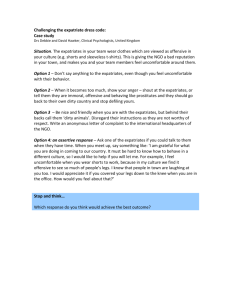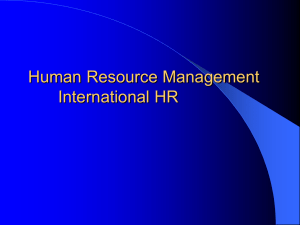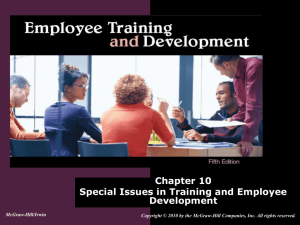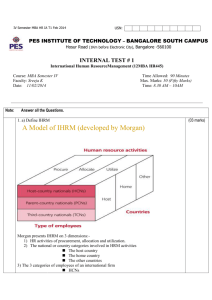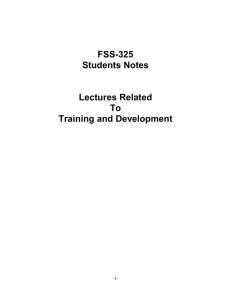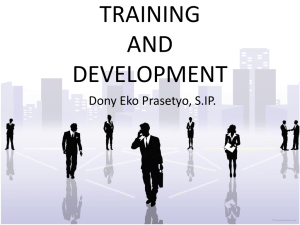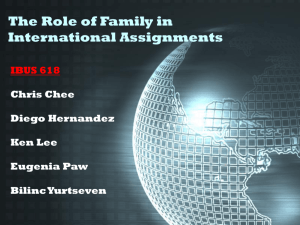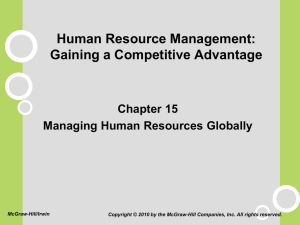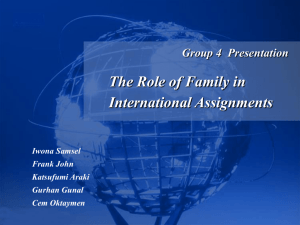Managing Global Organizations - Wisconsin Employee Relocation
advertisement
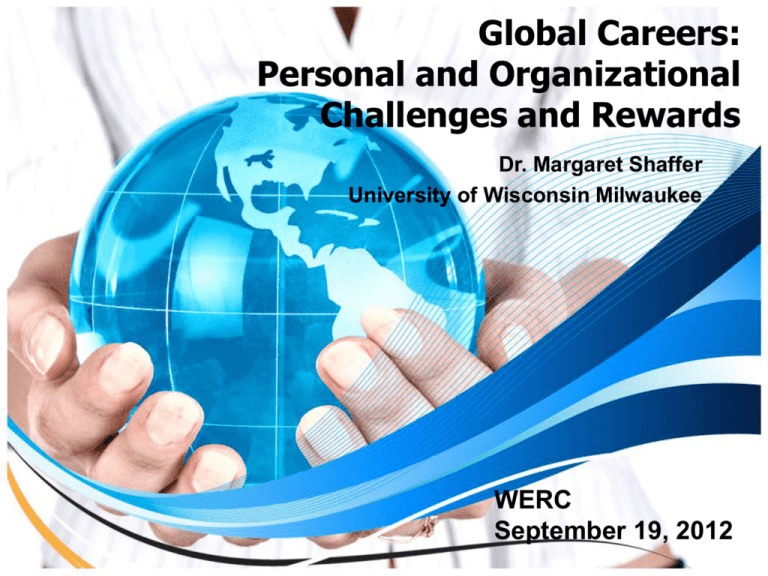
Global Careers: Personal and Organizational Challenges and Rewards Dr. Margaret Shaffer University of Wisconsin Milwaukee WERC September 19, 2012 Agenda • • • • • Global careers in perspective Global career alternatives Personal challenges and rewards Organizational challenges and rewards Research trends and opportunities Global Bingo Exercise Global Bingo • Goals: Assess global knowledge; create awareness of global complexities; emphasize the importance of shared knowledge in global settings; get to know each other better; have fun; and win prizes • To win, have five correct answers down, across, or diagonally • You may not answer the questions on your own bingo board • Find someone who can answer a question, have him/her initial the box and fill in the answer without stating the answer aloud • Obtain no more than two answers from any one person • When you have five down, across, or diagonally, yell “Global Bingo!” Global Careers Flexpatriates Short-term Assignees Virtual Team Members Global Domestics Alternatives to Corporate Expatriates Self-initiated Expatriates Frequent Flyers Commuters Comparison of Expatriates Corporate Expatriates Self-Initiated Expatriates Purpose Managerial control Skill/technology transfer Management development Personal development Career development Duration Usually 12-36 months Varies (short-term to permanent) Location 1 country 1 country Relocation With family With or without family Advantages Professional and personal development Relationship building and integration with host country nationals Global boundary-spanner Professional and personal development Relationship building with host country nationals Disadvantages Expensive Lack of flexibility Family adjustment problems Separation from extended family Personal risk/expense Contractual obligation Separation from extended family Comparison of Global Travelers and Global Domestics Short-term Assignees Flexpatriates Purpose Skill/technology transfer Problem solving Management control Management development Project-based Problem solving Skill/technical transfer Duration Usually 3-12 months Usually 1-2 months Location 1 or few countries Multiple countries Relocation Usually without family Without family Advantages Flexibility and simplicity Cost effectiveness Global boundary-spanner Flexibility and simplicity Cost effectiveness Global boundary-spanner Global perspective Disadvantages Separation stress – alcoholism, divorce, health issues Lack of integration with host country nationals Separation/travel stress – alcoholism, divorce, health issues Time zone differences Lack of social integration at home and host locations Comparison of Global Travelers and Global Domestics IBTs Global Domestics Purpose Knowledge-transfer Negotiations Discussions Meetings or conferences Service provider Buyer of products/supplies Logistics manager Duration Usually 1-2 weeks None or limited trips Location Multiple countries 1 or multiple countries Relocation Without family None Advantages Flexibility and simplicity Most cost effective Global boundary-spanner Relationship maintenance with home-country colleagues Flexibility and simplicity Disadvantages Separation/travel stress – alcoholism, divorce, health issues Time zone differences Host country relationships limited to work colleagues Lack of global perspective Difficult to develop relationships with those in other countries Assignment Policies Currently in Place Long-term Assignments 96% Short-term Assignments 86% 1-Way Move 44% Localization of Expatriates 35% Extended Business Travel 25% Local Hires 22% Commuter 26% Rotational Assignments 18% Developmental 18% Virtual Teams 3% Other 8% 0% 20% 40% 60% Brookfield Global Relocation Services 2012 80% 100% 120% Future Assignment Policies under Consideration Localization of Expatriates 36% Extended Business Travel 22% Commuter 20% Short-term Assignments 33% One-way Moves 24% Local Hires 25% Developmental 27% Long-term Assignments 28% Rotational 13% Virtual Teams 5% Other 14% 0% 5% 10% 15% 20% Brookfield Global Relocation Services 2012 25% 30% 35% 40% Who and Where INTERNATIONAL ASSIGNMENTS Profile of International Assignees • 80% are male • Ages – 13% are 20-29 years old – 31% are 30-39 years old – 34% are 40-49 years old – 19% are 50-59 years old – 3 % are 60+ • 79% have not had any expatriate experience • 89% were already employed by the company • 60% are married • 43% took children on the assignment • 81% of those married had spouse/partner accompany them on assignment Assignment Destinations Top Locations Emerging New Locations Most Challenging Locations United States Chili China China Brazil Brazil United Kingdom Australia India Singapore India Russia Germany Russia United States Australia South Africa United Kingdom Global Careers and the Individual Challenges and Rewards Major Personal Challenge: Cross-Cultural Adjustment • Anticipatory adjustment influenced by pre-departure training, previous experience with same country or similar culture • In-country adjustment affected by ability to maintain a positive outlook under high pressure, interact well with HCN’s, understand cultural values and norms, handle job responsibilities, adapt to organizational culture, self and family’s ability to handle new culture, and expat’s ability to “get along” in organization Expatriate Challenges Mood • Adjustment – Work – Interaction – Cultural • Spouse adjustment • Global knowledge, skills and abilities High Low 1 2 3 4 5 6 Months in a New Culture Expatriate Failure • Failure – Return home early – Poor performance – Poor adjustment • Cost of failure can be quite high – relocation and replacement costs, damage to reputation, lost business, etc. Causes of Assignment Failure • • • • • • Spouse/partner dissatisfaction Other family concerns Job does not meet expectations Inability to adapt Inadequate job performance Poor candidate selection Expatriate Re-Entry • Reverse culture shock • Readjustment problems – New position constitutes a demotion – Lack of opportunity to use skills learned abroad – Salary and benefits may decrease – Others do not relate to foreign perspective • Up to 25% of returning expats leave the company within one year after returning Transition Strategies • To facilitate adjustment – Individual and firm agree upon the length of the tour of duty – Mutually agreeable job identified for expatriate return • Keep expatriate involved in home office communication and projects while s/he is abroad • Proactive strategy that provides an effective support system to allay concerns about career issues Global Careers: Personal Rewards • • • • • • Personal growth and development Greater self-confidence Increased autonomy and responsibilities Global mindset Transferable skills Faster promotions Global Careers and the Organization Challenges and Rewards Purposes of Expatriate Assignments • • • • • • • • Fill a skills gap (technical or managerial) Build global relationships Craft a common corporate identity and culture Market products Transfer technology to foreign subsidiaries Provide managers with international experience Reward long-time employees Provide better on-site control of foreign operations Organizational Challenges • • • • • Broader and more flexible perspective More involvement in employees’ lives Greater exposure to problems and difficulties Greater exposure to external influences Greater complexities in all areas of human resource management Female Expatriates • Less than 20% of expatriates are female • Female expatriates have lower failure rates than males – Males: 10-40% – Females: 3% • More difficult to get the job than to do the job • Female expatriates are seen as foreigners first and as women second • Treated with the same respect as male expatriates • Being a female can sometimes be an advantage Dual-Career Couples • More employees are refusing int’l assignments because of spouse employment – Loss of spouse’s income – Derailment of spouse’s career • MNCs have to select from a diminishing pool of qualified applicants Strategic Responses for Dealing with Dual-Career Challenges • • • • • Intercompany networking Job-hunting assistance Intracompany employment Support for commuter marriages On-assignment career support Critical Assignment Management Challenges Cost of assignment 13% Controlling policy exceptions 11% Careerm management 9% Retention of repatriates 9% Compliance 7% Inability to use experience 6% Mobility team resources 6% Complex administration program 4% Lack of mobility technology 4% Return on investment 4% 0% 2% 4% 6% 8% 10% 12% 14% Initiatives to Improve Expatriate ROI Candidate Selection/Assessment 30% Career Planning 23% Communication of Objectives 20% Assignment Preparation 9% Mandatory Cross-cultural Training 5% Mentoring 5% Recognition/Communication During… 5% Mandatory Destination Support 1% Company Intranet 1% Web-based CC Training 1% 0% 5% 10% 15% 20% 25% 30% 35% Brookfield Global Relocation Services 2012 Organizational Rewards • Pool of experienced international employees • Accumulation of international knowledge, skills and abilities • Global mindset among management team • Control over subsidiaries • Transfer of knowledge and competence to subsidiaries The Global Employee Mobility (GEM) Project Global Work Experiences – Research and Practice The Global Employee Mobility Project • Aim is to improve the success of global employees • Consortium of academics from around the world • Research on all forms of global work experiences – – – – – – Expatriates/repatriates Short-term assignees Flexpatriates International Business Travelers (IBTs) Global virtual team members Global domestics Taxonomy of Global Work Experiences Degree of Boundary Integration Low Global High Virtual Team Members High Flexpatriates Corporate Expatriates Self-Initiated Expatriates Degree of Cognitive Mobility Global Work Experiences International Business Travelers Global Domestics Short-term Assignees Low Low High Degree of Physical Mobility Dimensions of Global Work • We define global work experiences along three dimensions that identify unique requirements of the different types of global work experiences: – Physical mobility - degree to which the work role requires the global employee to travel, or relocate, internationally – Cognitive flexibility - the degree to which the global work requires role incumbents to adjust their thought patterns and scripts to effectively interact with people and adapt to situational demands across cultures. – Non-work disruption – the degree to which the work role requirements disrupt or interfere with the employee’s normal activities and routines outside of work. Choices, Challenges, and Consequences of Global Work Organizational Personal Choices Challenges Consequences • Country and family considerations • Adjustment and coping with stress • Satisfaction • Intrinsic and extrinsic motivators • Work and nonwork demands • Career progression • Personal characteristics • Inter-cultural relationships • Safety concerns • Identity transformation • Selection criteria • Support resources for employees and families • Fit between employee and global work experience type • Incentive plans • Preparing employees for global work • Transition management • Career management • Employee engagement • Well-being • Development of global competencies • Performance • Retention • Utilization of global competencies • Work goal attainment Firm Participation • Provide survey access to – Global employees – Spouses/partners and colleagues (if possible) • Benefits – Summary of survey results – Suggestions for improving global work experiences
